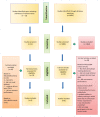Does Iron Supplementation Improve Performance in Iron-Deficient Nonanemic Athletes? - PubMed (original) (raw)
Review
Does Iron Supplementation Improve Performance in Iron-Deficient Nonanemic Athletes?
Amity Rubeor et al. Sports Health. 2018 Sep/Oct.
Abstract
Context: Supplementing iron-deficient nonanemic (IDNA) athletes with iron to improve performance is a trend in endurance sports.
Objectives: To investigate the benefits of iron on performance, identify a ferritin level cutoff in IDNA athletes, and determine which iron supplementation regimens are most effective.
Data sources: A search of the PubMed, CINAHL, Embase, ERIC, and Cochrane databases was performed in 2014 including all articles. Citations of pertinent review articles were also searched. In 2017, the search was repeated.
Study selection: Inclusion criteria comprised studies of level 1 to 3 evidence, written in the English language, that researched iron supplementation in nonanemic athletes and reported performance outcomes.
Study design: Systematic review.
Level of evidence: Level 3.
Data extraction: The search terms used included athletic performance, resistance training, athletes, physical endurance, iron, iron deficiency, supplement, non-anemic, low ferritin, ferritin, ferritin blood level, athletes, and sports.
Results: A total of 1884 studies were identified through the initial database search, and 13 were identified through searching references of relevant review articles. A subsequent database search identified 46 studies. Following exclusions, 12 studies with a total of 283 participants were included. Supplementing IDNA athletes with iron improved performance in 6 studies (146 participants) and did not improve performance in the other 6 studies (137 participants). In the 6 studies that showed improved performance with iron supplementation, all used a ferritin level cutoff of ≤20 μg/L for treatment. Additionally, all studies that showed improved performance used oral iron as a supplement.
Conclusion: The evidence is equivocal as to whether iron supplementation in IDNA athletes improves athletic performance. Supplementing athletes with ferritin levels <20 μg/L may be more beneficial than supplementing athletes with higher baseline ferritin levels.
Keywords: athletic training; iron supplementation; medical aspects of sports; performance.
Conflict of interest statement
The authors report no potential conflicts of interest in the development and publication of this article.
Figures
Figure 1.
Flow diagram of literature selection on the effects of iron supplementation in iron-deficient nonanameic (IDNA) athletes. RCT, randomized controlled trial.
Figure 2.
Iron formulations—performance improvement.
Figure 3.
Iron formulations—no performance improvement.
Similar articles
- Effects of Oral Iron Supplementation on Blood Iron Status in Athletes: A Systematic Review, Meta-Analysis and Meta-Regression of Randomized Controlled Trials.
Šmid AN, Golja P, Hadžić V, Abazović E, Drole K, Paravlic AH. Šmid AN, et al. Sports Med. 2024 May;54(5):1231-1247. doi: 10.1007/s40279-024-01992-8. Epub 2024 Feb 26. Sports Med. 2024. PMID: 38407751 Free PMC article. - Iron supplementation improves energetic efficiency in iron-depleted female rowers.
DellaValle DM, Haas JD. DellaValle DM, et al. Med Sci Sports Exerc. 2014 Jun;46(6):1204-15. doi: 10.1249/MSS.0000000000000208. Med Sci Sports Exerc. 2014. PMID: 24195864 Clinical Trial. - The clinical value of serum ferritin tests in endurance athletes.
Garza D, Shrier I, Kohl HW 3rd, Ford P, Brown M, Matheson GO. Garza D, et al. Clin J Sport Med. 1997 Jan;7(1):46-53. doi: 10.1097/00042752-199701000-00009. Clin J Sport Med. 1997. PMID: 9117526 Review. - Iron as an ergogenic aid: ironclad evidence?
Rodenberg RE, Gustafson S. Rodenberg RE, et al. Curr Sports Med Rep. 2007 Jul;6(4):258-64. Curr Sports Med Rep. 2007. PMID: 17618003 Review. - Iron deficiency in sports - definition, influence on performance and therapy.
Clénin G, Cordes M, Huber A, Schumacher YO, Noack P, Scales J, Kriemler S. Clénin G, et al. Swiss Med Wkly. 2015 Oct 29;145:w14196. doi: 10.4414/smw.2015.14196. eCollection 2015. Swiss Med Wkly. 2015. PMID: 26512429 Review.
Cited by
- Efficacy of iron supplementation on physical capacity in non-anaemic iron-deficient individuals: protocol for an individual patient data meta-analysis.
Dugan C, Peeling P, Burden R, Richards T. Dugan C, et al. Syst Rev. 2024 Jul 15;13(1):182. doi: 10.1186/s13643-024-02559-4. Syst Rev. 2024. PMID: 39010146 Free PMC article. - Effect of Off-Season Iron Supplementation on Aerobic Capacity of Female Handball Player: A Randomized, Double-Blinded, Placebo-Controlled Study.
Safa G, Hemmatinafar M, Nemati J, Imanian B, Suzuki K. Safa G, et al. Curr Dev Nutr. 2024 May 8;8(6):103767. doi: 10.1016/j.cdnut.2024.103767. eCollection 2024 Jun. Curr Dev Nutr. 2024. PMID: 38868615 Free PMC article. - Longitudinal changes in anthropometric, physiological, and physical qualities of international women's rugby league players.
Scantlebury S, Costello N, Owen C, Chantler S, Ramirez C, Zabaloy S, Collins N, Allen H, Phillips G, Alexander M, Barlow M, Williams E, Mackreth P, Barrow S, Parelkar P, Clarke A, Samuels B, Roe S, Blake C, Jones B. Scantlebury S, et al. PLoS One. 2024 May 14;19(5):e0298709. doi: 10.1371/journal.pone.0298709. eCollection 2024. PLoS One. 2024. PMID: 38743656 Free PMC article. - Female Athlete Triad and Relative Energy Deficiency in Sport (REDs): Nutritional Management.
Grabia M, Perkowski J, Socha K, Markiewicz-Żukowska R. Grabia M, et al. Nutrients. 2024 Jan 25;16(3):359. doi: 10.3390/nu16030359. Nutrients. 2024. PMID: 38337644 Free PMC article. Review. - The IRONy in Athletic Performance.
Kardasis W, Naquin ER, Garg R, Arun T, Gopianand JS, Karmakar E, Gnana-Prakasam JP. Kardasis W, et al. Nutrients. 2023 Nov 28;15(23):4945. doi: 10.3390/nu15234945. Nutrients. 2023. PMID: 38068803 Free PMC article. Review.
References
- Akabas SR, Dolins KR. Micronutrient requirements of physically active women: what can we learn from iron? Am J Clin Nutr. 2005;81:1246S-1251S. - PubMed
- Balaban EP. Sports anemia. Clin Sports Med. 1992;11:313-325. - PubMed
- Beard J, Tobin B. Iron status and exercise. Am J Clin Nutr. 2000;72:594S-597S. - PubMed
- Blee T, Goodman C, Dawson B, Stapff A. The effect of intramuscular iron injections on serum ferritin levels and physical performance in elite netballers. J Sci Med Sport. 1999;2:311-321. - PubMed
- Burden RJ, Morton K, Richards T, Whyte GP, Pedlar CR. Is iron treatment beneficial in, iron deficient but non-anaemic (IDNA) endurance athletes? A meta-analysis. Br J Sports Med. 2015;49:1389-1397. - PubMed
Publication types
MeSH terms
Substances
LinkOut - more resources
Full Text Sources
Other Literature Sources
Medical
Research Materials


